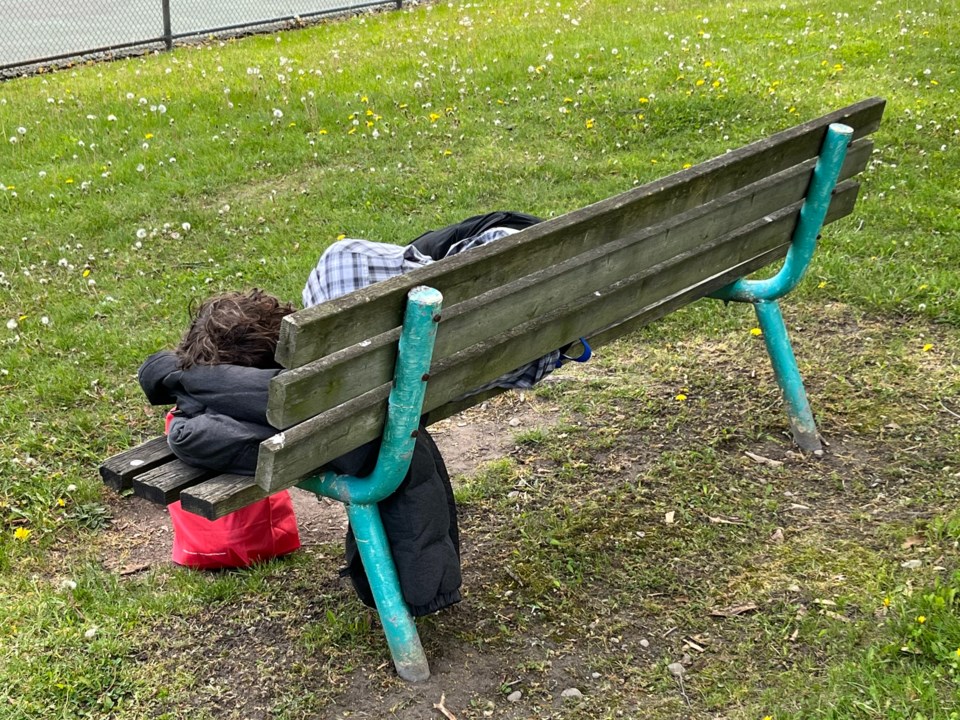The city has spent more than half of the $825,000 earmarked for the first year of its controversial measures to address chronic homelessness and public safety.
Figures released by the city on Wednesday show $480,000 was spent since the measures were unanimously approved, by direct motion of city council, on May 17, 2023.
The measures also deal with drug addiction, mental health problems, shelter, counselling, limiting camping in city parks, feeding the hungry in public places and panhandling restrictions.
The largest expenditure was $300,000 to operate a shuttle service for individuals released from the Central North Correctional Centre (CNCC) in Penetanguishene.
Since last September, 252 former CNCC prisoners have been diverted from Barrie, said Michael Prowse, the city’s chief administrative officer, who has the task of running the chronic homelessness and public safety measures programs.
“Individuals that would have arrived in Barrie actually arrived in their destinations closer to their home communities,” he said, “and that would not have happened if it was not for the investment that this council has put in to this shuttle program, which is continuing to run.
“They have arrived much closer to home with a better chance for success,” Prowse added.

“We’ve been able to provide additional options to help individuals successfully transition out of the correctional system,” Mayor Alex Nuttall said in his city-wide progress report.
The May 17, 2023 council direct motion included two-year, $1.65-million funding from the city’s reinvestment reserve.
The city spent $100,000 toward the operation of cooling and warming programs in Barrie for at-risk people, along with daily meal programs.
Also committed was $50,000 to the social and community invest fund, administered by the County of Simcoe, to be used toward programs supporting food security within Barrie.
There’s also a family reunification fund to pay for transportation costs and help reunite individuals with families or support groups. The Elizabeth Fry Society and John Howard Society each received a $10,000 cheque last July. These organizations have helped reconnect and transport 68 individuals to their home communities, where they have support.
Financial assistance of $5,000 was also provided to a local organization, No More Starving Artists, to provide approximately 60 nutritious food orders to those in need.
And there’s $5,000 to the Salvation Army to support a lunch program, and address the deficit resulting from its additional services provided during the COVID-19 pandemic.
The measures also addressed changes to city bylaws, protocols and processes to prohibit the use or distribution of tents or tarps in public parks or on public land without a permit, prohibit the distribution of food and groceries in public spaces without the use of a permit, and reduce the time required to address camping in parks and storage of goods in parks or public spaces.
Bylaw amendments were presented for city council, but they were not adopted and were referred back to staff for "modernization."
Prowse said the bylaws are being reviewed and compared to other municipal bylaws and language. City staff are completing changes to the bylaws to update and clarify the language, without adding new restrictions, and they'll be presented in a staff report during council’s fall session.
The protocols and practices have also been modified to address council’s direction to the extent feasible, in light of the two Ontario court decisions related to removal of encampments. Each situation is addressed on a case-by-case basis in the context of these court decisions.
The measures were also to look at methods to prohibit the payment to panhandlers on city streets, intersections and highway ramps. Staff investigated potential methods, including legal options that may be available to council, as part of a bylaw.
But after receiving a legal opinion, presented to council in a confidential staff report last February, no further action is being undertaken.
Same with dealing with the placement of signs on city off-ramps to discourage panhandling or financial support and instead encouraging donations to local social service agencies. No further action is being undertaken by the city.



